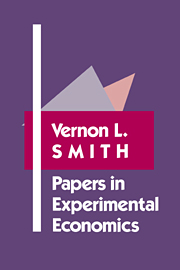Book contents
- Frontmatter
- Contents
- Preface
- Acknowledgments
- Part I The Formative Years
- Part II Institutions and Market Performance
- Part III Public Goods
- Part IV Auctions and Institutional Design
- Introduction
- 25 Incentives and Behavior in English, Dutch and Sealed-Bid Auctions
- 26 Theory and Behavior of Single Object Auctions
- 27 A Test that Discriminates Between Two Models of the Dutch-First Auction Non-Isomorphism
- 28 Theory and Behavior of Multiple Unit Discriminative Auctions
- 29 Theory and Individual Behavior of First-Price Auctions
- 30 A Combinatorial Auction Mechanism for Airport Time Slot Allocation
- 31 Designing ‘Smart’ Computer-Assisted Markets
- PART V Industrial Organization
- Part VI Perspectives on Economics
25 - Incentives and Behavior in English, Dutch and Sealed-Bid Auctions
Published online by Cambridge University Press: 06 July 2010
- Frontmatter
- Contents
- Preface
- Acknowledgments
- Part I The Formative Years
- Part II Institutions and Market Performance
- Part III Public Goods
- Part IV Auctions and Institutional Design
- Introduction
- 25 Incentives and Behavior in English, Dutch and Sealed-Bid Auctions
- 26 Theory and Behavior of Single Object Auctions
- 27 A Test that Discriminates Between Two Models of the Dutch-First Auction Non-Isomorphism
- 28 Theory and Behavior of Multiple Unit Discriminative Auctions
- 29 Theory and Individual Behavior of First-Price Auctions
- 30 A Combinatorial Auction Mechanism for Airport Time Slot Allocation
- 31 Designing ‘Smart’ Computer-Assisted Markets
- PART V Industrial Organization
- Part VI Perspectives on Economics
Summary
The Pareto optimality and price behavior of English and Dutch oral auctions, and First-Price and Second-Price sealed-bid auctions are compared under various procedures for assigning valuations among cash motivated bidders. The Vickrey propositions with respect to the mean and variance of prices under the English, Dutch and Second-Price auctions are not falsified by the data. Individual behavior and prices in the First-Price auction deviates considerably from Vickrey's Nash postulate. Behaviorly, the English and Second-Price auctions appear to be isomorphic, but the Dutch and First-Price auctions may not be isomorphic.
Evidence for the existence of auctions is recorded in the histories of ancient Babylon and Rome (Cassady (1976, pp. 26-29)), and auctioning institutions continue today as important mechanisms for the exchange of a very large variety of commodities (Cassady (1967, pp. 16-19)). Yet there seems to have been only rare empirical or theoretical studies of the behavioral properties of alternative auction techniques. The unusual variety of different methods of auctioning goods suggests that the method of auctioning is believed to effect the transaction cost or the price of an exchange. We propose to use laboratory experimental methods for a fairly extensive study of the common forms of oral and sealed-bid (or written-bid) auctioning. The present paper reports the first series of experiments in this exploration.
- Type
- Chapter
- Information
- Papers in Experimental Economics , pp. 515 - 536Publisher: Cambridge University PressPrint publication year: 1991



